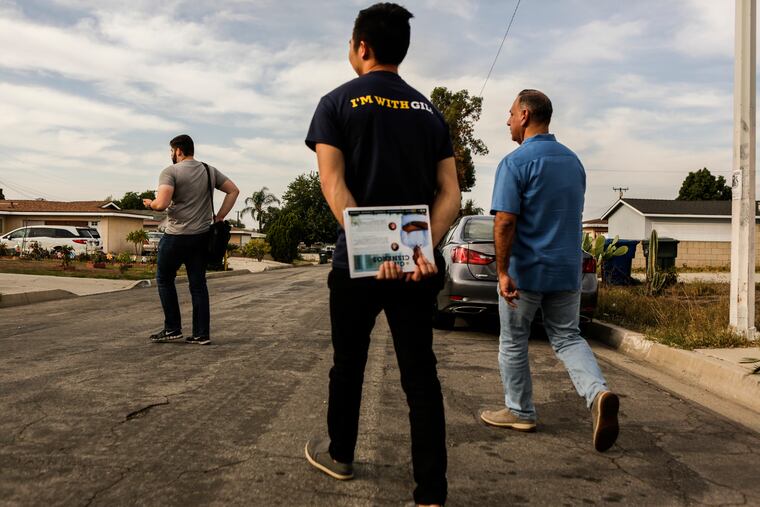Asian Americans represent untapped voting power in the U.S. | Opinion
Often disenfranchised or disengaged Asian voters have the ability to reimagine the America we were born into while deeply understanding our parents’ unique societal struggles.

While I was watching the news with an older relative a few weeks ago, they hastily criticized the restless George Floyd protests that had damaged around 50 Korean American-owned small businesses in Philadelphia — but dropped silent when I brought up the restless people in Gwangju, South Korea.
As an American citizen born to two South Korean immigrants, I grew up familiar with how the small city of Gwangju became the bloody epicenter of antiauthoritarian sentiment after President Chun Doo Hwan declared martial law on the nation in May 1980. In one of the deadliest events in South Korea’s modern history, hundreds of peaceful pro-democracy demonstrators were killed at the hands of the “black berets,” soldiers deployed by President Chun’s iron fist and sanctioned by the Carter administration. Although the demonstrators were then seen as dangerously subversive, they eventually became martyrs for galvanizing an era of Korean democracy.
» READ MORE: Pa. sees rise in immigrants who can vote in 2020 election
No protesters should have to die for their cause, period. But the energy of the Gwangju demonstrators is what Asian Americans should be bringing to U.S. politics today. In the U.S., the so-called champion of modern liberal society, Asians have yet to experience these political moments of reckoning — though this week’s announcement of Kamala Harris as Joe Biden’s vice presidential pick marks the first time someone of Asian descent is on the presidential ticket. Despite being the fastest-growing population in the country, only about 49% of Asian Americans voted in the 2016 presidential election — lower than the white and Black turnout at 65% and 60%, respectively, and close to the Hispanic turnout at 47%.
We can see that number as reflecting a generational phenomenon. People like my parents, who fled their politically stifled homes after immigration quotas were lifted in the ’60s, have been targeted by nativist voter suppression efforts and discouraged by language barriers. Unsurprisingly, American democracy might still feel foreign to many of them. Systemic barriers need to be broken down, starting with legislators who should reverse discriminatory laws that make it harder for citizens with transliterated names to register to vote, and policymakers who should disaggregate Asian American and Pacific Islander polling data by ethnic subgroup to address the unique needs of these diverse communities.
» READ MORE: Anti-Asian discrimination continues, months into the coronavirus | Opinion
But the broad lack of political and civic engagement can make our community itself miss the mark, especially when it comes to standing up against anti-Blackness. Consider the 2016 Peter Liang protests. Liang, a Chinese American police officer, was convicted of manslaughter for fatally shooting Akai Gurley, an unarmed 28-year-old Black man. Thousands of Asian American immigrants took to the streets of New York with signs that read, “One Tragedy, Two Victims,” accusing our justice system of scapegoating Asians. It was a misguided call to action, given America’s long history of police brutality specifically against the Black community.
It’s time for Asian American voters, particularly those of us who already have easy access to voting, to take responsibility for our political power and use it to fight inequities beyond what we feel directly targets us. Now more than ever, the children of Asian immigrants — the so-called “second generation” of Asian Americans — should feel the imperative to flip the political switch.
» READ MORE: Philadelphia needs to get youth voting | Opinion
We have the unique ability to reimagine the America we were born into while deeply understanding our parents’ unique societal struggles. The moment we embrace this political privilege is the moment we are able to lead the fight against injustice.
With a few months left until the most divisive election in our modern history, the baton for creating a more equitable future is in our hands. By linking arms in solidarity, putting pressure on our representatives, showing up at protests, and volunteering for advocacy groups, we can make incremental steps in reshaping our institutions.
But by casting our ballot, as one of the most crucial swing voter groups, we use — in the words of the late congressman and civil rights icon John Lewis — “the most powerful nonviolent tool we have to create a more perfect union.” Now is the time to not only stand on the right side of history but also create the right history ourselves.
Neil Goh is a lifelong resident of Pennsylvania and a volunteer for the Woori Center, an Asian American advocacy organization in the Greater Philadelphia area.